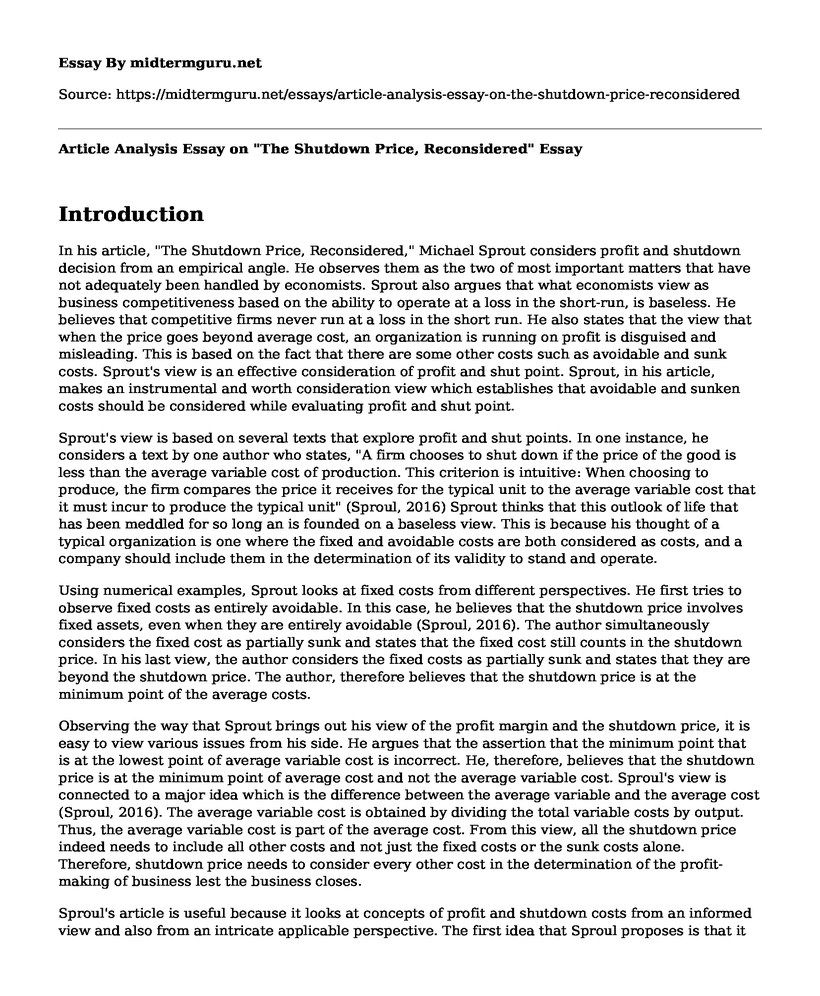Introduction
In his article, "The Shutdown Price, Reconsidered," Michael Sprout considers profit and shutdown decision from an empirical angle. He observes them as the two of most important matters that have not adequately been handled by economists. Sprout also argues that what economists view as business competitiveness based on the ability to operate at a loss in the short-run, is baseless. He believes that competitive firms never run at a loss in the short run. He also states that the view that when the price goes beyond average cost, an organization is running on profit is disguised and misleading. This is based on the fact that there are some other costs such as avoidable and sunk costs. Sprout's view is an effective consideration of profit and shut point. Sprout, in his article, makes an instrumental and worth consideration view which establishes that avoidable and sunken costs should be considered while evaluating profit and shut point.
Sprout's view is based on several texts that explore profit and shut points. In one instance, he considers a text by one author who states, "A firm chooses to shut down if the price of the good is less than the average variable cost of production. This criterion is intuitive: When choosing to produce, the firm compares the price it receives for the typical unit to the average variable cost that it must incur to produce the typical unit" (Sproul, 2016) Sprout thinks that this outlook of life that has been meddled for so long an is founded on a baseless view. This is because his thought of a typical organization is one where the fixed and avoidable costs are both considered as costs, and a company should include them in the determination of its validity to stand and operate.
Using numerical examples, Sprout looks at fixed costs from different perspectives. He first tries to observe fixed costs as entirely avoidable. In this case, he believes that the shutdown price involves fixed assets, even when they are entirely avoidable (Sproul, 2016). The author simultaneously considers the fixed cost as partially sunk and states that the fixed cost still counts in the shutdown price. In his last view, the author considers the fixed costs as partially sunk and states that they are beyond the shutdown price. The author, therefore believes that the shutdown price is at the minimum point of the average costs.
Observing the way that Sprout brings out his view of the profit margin and the shutdown price, it is easy to view various issues from his side. He argues that the assertion that the minimum point that is at the lowest point of average variable cost is incorrect. He, therefore, believes that the shutdown price is at the minimum point of average cost and not the average variable cost. Sproul's view is connected to a major idea which is the difference between the average variable and the average cost (Sproul, 2016). The average variable cost is obtained by dividing the total variable costs by output. Thus, the average variable cost is part of the average cost. From this view, all the shutdown price indeed needs to include all other costs and not just the fixed costs or the sunk costs alone. Therefore, shutdown price needs to consider every other cost in the determination of the profit-making of business lest the business closes.
Sproul's article is useful because it looks at concepts of profit and shutdown costs from an informed view and also from an intricate applicable perspective. The first idea that Sproul proposes is that it would be senseless to continue running a business that makes adequate revenue to meet the average variable costs. This is because, for a business to be considered in the line of profit, it must make advances towards beating all the average costs and making a profit above all the costs which place the business in the highlight of smooth operations (Uslu & Teeter, 2017). As learned in the unit, fixed costs must be paid whether an organization is shut down or not. Also, since fixed costs are not avoidable, and they are not recoverable. Therefore, as Sproul states, it is necessary for any business that is deciding on shutdown price to consider the fixed costs and the sunk costs.
Sproul's article considers profit and shutdown decision in an empirical manner. In the article, the author gives the view of profits and shutdown decisions as purely based on costs. Therein, he states that economists have a hard view that seems to frustrate the efforts of the shutdown decision. Economists have thought that the decision to make a shutdown is influenced by the average variable costs alone while it should be inclusive of the entire variable costs. Therefore, Sproul presents that shutdown decision should be a summative decision that is based on all the costs that are unavoidable and unrecovered. This view agrees with the unit's concentration on profits and shutdown decision, and hence Sproul's article is essential profits and shutdown decision-making.
References
Sproul, M. (2016). The Shutdown Price, Reconsidered.
Uslu, H., & Teeter, L. (2017). Shutdown Decision of Firms Based on Variable Costs and Demand: Empirical Evidence From the Forest Products Industry of Alabama. The American Economist, 62(1), 43-65.
Cite this page
Article Analysis Essay on "The Shutdown Price, Reconsidered". (2023, Feb 09). Retrieved from https://midtermguru.com/essays/article-analysis-essay-on-the-shutdown-price-reconsidered
If you are the original author of this essay and no longer wish to have it published on the midtermguru.com website, please click below to request its removal:
- The Mazees Coffee Cafes Business Plan
- Essay on Hotel Monaco Chicago: Value Creation
- Business Administration Case Study Examples: Customer Needs, Strategic Management and Partnerships
- Research Paper on Theranos Scandal
- Plan for Hiring - Essay Sample
- System Security Manager at Microsoft Corporation: Securing Business Information - Essay Sample
- Maintaining Safe Work Environments: Manager's Role & OSHA Compliance - Essay Sample







